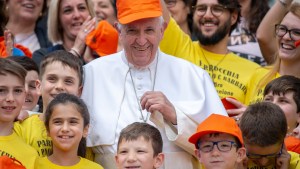[Note: An Aleteia editor came across this article about learning to parent from our parents, and started to muse about how we learn to believe, often, from our parents. The Pope likes to talk about how his grandmother was instrumental in his faith. So, the Aleteia staff decided to share an anecdote about our believing and our parents’ role in it. We hope you enjoy them! Click for the reflections from John Burger, Cerith Gardiner and J-P Mauro; today we hear from our Editorial Director, Fr. Peter John Cameron, OP.]
It begins in the basement of St. Luke’s Church in Ellington, Connecticut, at Sunday school. My first grade catechism class took place in that cavernous hall, simultaneously with the classes of all the other grades, in a “classroom” ingeniously sculpted out of curtains rigged to form partitioning “walls.”
I remember being puzzled by the lesson on that particular Sunday morning because it claimed that we are all “children of God.” I even raised my hand to express my consternation, informing the teacher with the objection, “My mother and father are grown-ups — they are not children.” She answered well in her patient reply — “Age doesn’t matter. … Because God is a Father who sees all people as his own children” — and I went home filled with wonder.
So struck was I by the novelty of this that I shared with my mother and father what I had learned. I think they got a kick out of my original opposition to the notion. But then they went on to explain it more. Since it is so true that each person is a child of God, for this very reason we are called to love everyone, without exception.
Here I felt sorry for my poor naïve parents, because obviously in their devout zeal they had failed to take into consideration the one glaring exception to the rule. I will call him Daryl Dorn — the terror of Hany Lane. He was the older boy who, on the last leg of your walk home from Skinner Road School, would appear out of nowhere, yelling and armed with a looped snake with which he lunged at you as he proceeded to chase you all the way to your front door. That guy.
“But not Daryl Dorn,” I countered. “I don’t have to love him. He chases people with a snake.” But my father insisted: Yes, even him. I even have to love Daryl Dorn. I especially have to love Daryl Dorn. Because what made him act that way was probably that he wasn’t getting enough love in his life. And he is God’s child like us all.
Only later did my brothers let me in on it: You big idiot: It’s a rubber snake. But for my parents, it wasn’t even a factor — poisonous or plastic. Because the main issue wasn’t about what he did; it was about who he is. He is a child of God. There will never be a reason not to love everyone, without exception. Even if they’re brandishing a fake snake.


